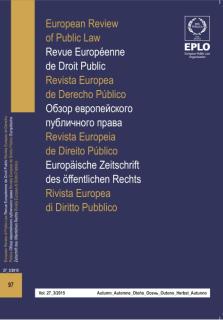
SECURITY IN THE BALANCE:
REVIEWING SURVEILLANCE MEASURES IN THE 'WAR ON TERROR'
ANNA TSIFTSOGLOU
Postdoctoral Fellow, Princeton University, annast@princeton.edu
More than a decade after the 9/11 attacks, lawyers, politicians and courts continue to assess the impact of the so-called 'war on terror' on law and human rights. Many states across the world seem to have valued security higher than others, a choice reflected in post-9/11 legislation. With this paper, I aim to focus on courts, rather than parliaments, as forums of such choices, primarily on two diverse jurisdictions, the European Court of Human Rights and the US Supreme Court. 'Security in the Balance' here is viewed in the context of state surveillance measures post-9/11, and conceptualized in the 'war on terror' model as opposed to the 'law enforcement' model. Exceptionalism works differently in the 'war' and the 'law enforcement' model and, as shown, this is reflected in the adjudication of surveillance measures on both sides of the Atlantic. I find that, even in times of exception, European judges, compared to their American counterparts, have proved to be less deferential to the government prerogatives in security matters.
Plus d'une décennie après les attaques du 11-Septembre, les avocats, les hommes politiques et les tribunaux continuent à évaluer l'impact de ladite "guerre contre le terrorisme" sur le droit et les droits de l'homme. De nombreux Etats de par le monde semblent avoir accordé à la sécurité plus d'importance que d'autres, un choix qui se reflète dans la législation d'après le 11-Septembre. Dans cet article, j'entends me concentrer sur les tribunaux plutôt que sur les parlements, en tant que forums pour de tels choix, et notamment sur deux juridictions différentes, la Cour européenne des droits de l'homme et la Cour suprême des Etats-Unis. La "sécurité en jeu" est vue ici dans le contexte des mesures de surveillance publique d'après le 11-Septembre et est conceptualisée dans le modèle de la "guerre contre le terrorisme", opposé au modèle du "respect de la loi". L'exceptionnalisme fonctionne différemment dans le modèle de la "guerre" et dans celui du "respect de la loi" et, comme je le montre, cela se reflète dans le jugement des mesures de surveillance des deux côtés de l'Atlantique. Je trouve que, même dans les périodes d'exception, les juges européens, comparés à leurs confrères américains, se sont avérés moins respectueux des prérogatives du gouvernement en matière de sécurité.
[An earlier version of this paper, co-authored with Massimo Fichera, Lecturer at the University of Helsinki, was presented at the 9th World Congress of Constitutional Law themed 'Constitutional Challenges: Global and Local' co-organized by the International Association of Constitutional Law (IACL) and the University of Oslo, Norway in June 16-20, 2014. The author would like to thank David Cole, Lech Garlicki, Federico Fabbrini, as well as the principal congress organizers Martin Scheinin and Eivind Smith for the very fruitful discussion.]





















